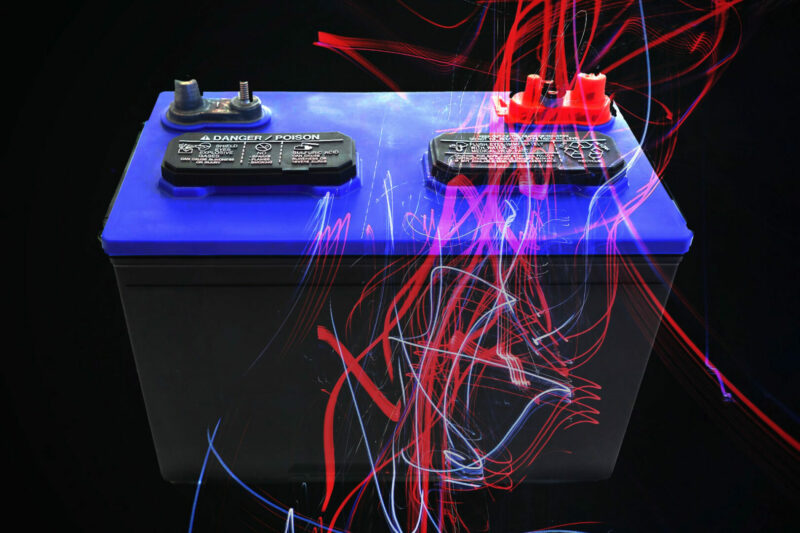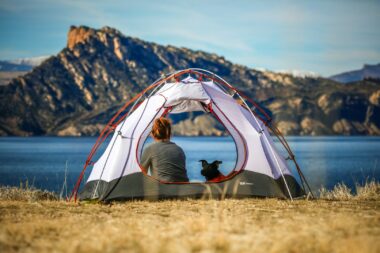Table of Contents Show
Your RV battery may not have the glitz and glamor of some of your other RV features. But without this quiet workhorse, you wouldn’t be able to enjoy the many comforts of home that an RV provides.
But all RV batteries are not created equal. Various RV battery types differ in their construction, chemical makeup, and maintenance requirements. So we’re here to sort it all out and help you buy the right battery.
What Is the Difference Between a Deep Cycle Battery and a Regular Battery?
Typically, an RV will have a deep cycle house battery. With, motorhomes, a standard auto battery is used to start the engine. Deep cycle batteries do what their name implies – provide a long, steady stream of power to run your RV’s electrical needs. You’ll need to recharge deep cycle batteries, either by connecting to shore power or generating your own via solar or wind energy systems.
On the other hand, typical auto batteries are designed differently. They provide a more powerful burst of electricity to start the engine quickly, but only over a short duration. The engine’s alternator then recharges these batteries.
The Different Types of RV Batteries
Not all RV battery types are the same, even after sorting out deep cycle vs. starter batteries. Here are the most common styles and what sets them apart.
Flooded Lead-Acid Batteries
These are the most basic and common types of batteries. This is primarily due to their relatively low price and long history in the RV industry.
They consist of positively and negatively charged lead plates submerged in an electrolyte solution, which helps chemically generate the power you need. You’ll need to top-off this solution with distilled water occasionally. Additionally, flooded lead-acid batteries typically need to be installed in a place with sufficient ventilation.
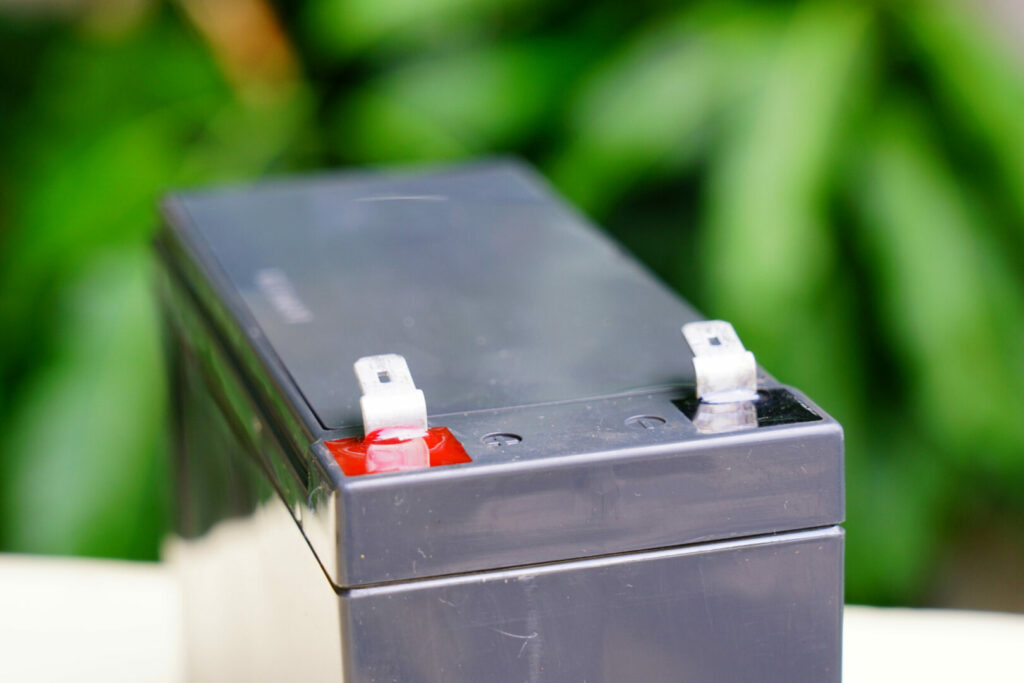
Absorbent Glass Mat (AGM) Batteries
Absorbent glass mat or AGM batteries rely on similar principles to flooded lead-acid batteries — an electrolyte solution and lead plates generate power. However, AGM batteries store the solution within the absorbent mat that gives the battery its name. This avoids the need for topping off and venting, as these batteries are completely sealed.
AGM batteries also operate better in extreme temperatures. In exchange for these benefits, you’ll need to pay a bit more per battery.
Gel Cell Batteries
Gel cells are another twist on the traditional lead-acid battery, with a gel replacing the typical electrolyte solution between the plates. Similar to an AGM battery, this sealed design removes the need for regular maintenance and extra ventilation.
However, they’ll also cost a bit of a premium compared to flooded lead-acid varieties and are unfortunately prone to damage if improperly charged or overcharged.
Lithium-Ion (LiFePO4) Batteries
Lithium-ion batteries are a game-changing technology that has been upending the world of RV battery types for more than a decade. The most common, Lithium Iron Phosphate or LiFePO4, uses a different chemical process to create the energy you draw from the battery.
The result is a much lighter weight, longer-lasting battery without the need for maintenance or restrictions on usage. As the technology is less common, it’s typically more expensive.
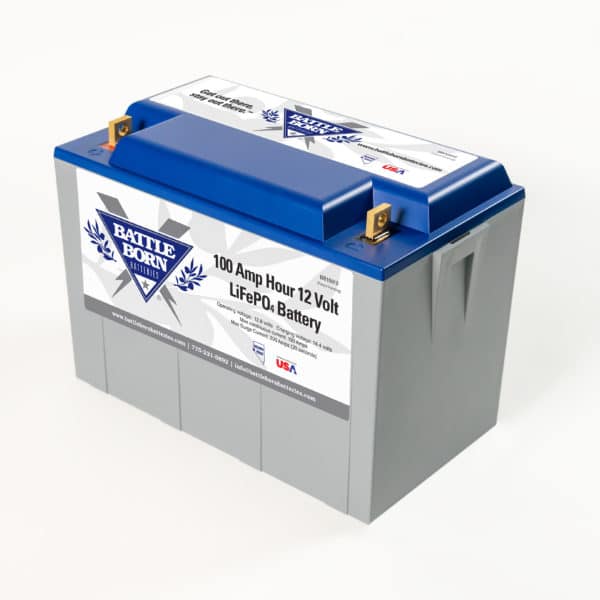
Pro Tip: Learn more about the pros and cons of each battery type in our Deep Cycle Battery Buying Guide.
How to Determine Which RV Battery Type Is Right for You
Now that you know all the important factors of the popular battery types, how do you choose the best one for your rig? Here are some key aspects of RV battery types to keep in mind to help in your decision-making.
1. Amp-Hour Rating
Amps are a measure of electric current, calculated by dividing the total wattage used by the voltage. An amp-hour is a unit of electric capacity equivalent to providing one amp of power for one hour. All deep cycle batteries will come with a stated rating to give you an idea of their overall capacity.
This rating is usually for 20 hours. You can determine how your electric usage measures up by multiplying amps you use at a given time by the number of hours you’re using them in between charges. Amp-hours are generally seen as the best measure of battery capacity as the calculation factors in voltage, which can vary depending on your battery’s mechanism.
2. Watt-Hours
Watts is a measure of electric usage. Every electric item you own will either have the wattage listed on it or have the information supplied in a manual. Watt-hours are simply the total wattage used multiplied by the hours used. This can also give you a sense of battery capacity.
3. Depth of Discharge and Lifespan
This is a crucial thing to consider to avoid running out of juice unexpectedly or potentially seriously damaging your batteries. While your battery may have a stated capacity, you’ll only be able to discharge a certain portion of it before you risk harming your batteries.
Flooded lead-acid batteries can only discharge 50%, while AGM, gel cell, and lithium batteries can typically use 80% or sometimes more of their capacity. This can make a huge difference if you’re a heavy power user without regular access to charging.
You should also weigh the overall lifespan of each battery type and how long it’ll last before replacement. Gel cell batteries are generally the shortest-lived, lasting two to five years, followed by flooded lead-acid batteries lasting four to six years under most conditions. AGM batteries will often work for four to eight years, while lithium batteries can last eight to 10 years or more, making them the longest-lasting RV battery types.
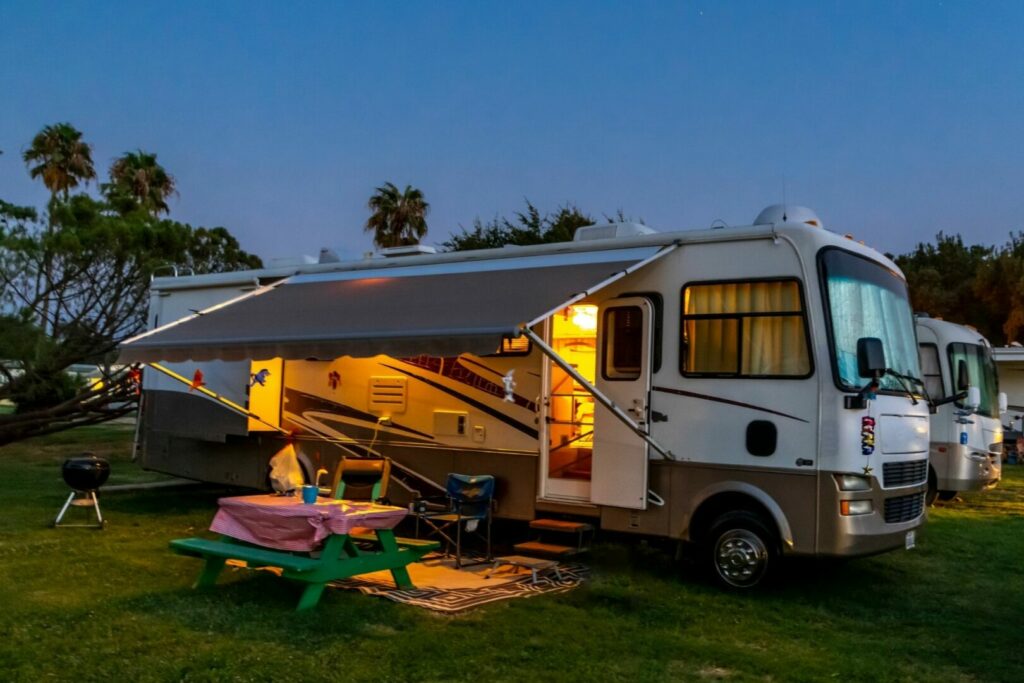
4. Maintenance Level
Many standard flooded lead-acid batteries have an unsealed design, meaning you’ll need to top off the fluids inside every few weeks. While this isn’t a huge hassle, those who want to save time should opt for sealed batteries like AGM, gel cell, or lithium models. They are also universally maintenance-free.
5. Cost
If you’re operating on a tight budget, you’ll generally find flooded lead-acid batteries to be the cheapest out there. They’re the oldest and most common and will set you back less than more modern battery styles.
On the flip side, lithium batteries tend to occupy the top of the price spectrum — at least in upfront costs. With their longer lifespan, lithium batteries can, in many cases, save owners money by requiring fewer replacements.
Pro Tip: When researching RV batteries, make sure to read 12 Volt Or 6 Volt RV Battery: Which Is Better?
6. Warranty
No one likes to think about their brand-new battery failing before they even purchase it. But it’s crucial to keep the warranty in mind, just in case.
Different brands or styles may have different lengths of time you’ll be covered if anything should go wrong. While you may never need it, a solid warranty may be the difference between shelling out money for an expensive replacement versus having a new, free battery provided for you.
7. How Often Will You Be Camping
How often you’ll be using your rig should also factor in how much you invest in your batteries. If you’re a weekend camper or just take your rig out for occasional vacations, a flooded lead-acid or other more affordable battery may be all you need.
However, if you’re a full-time RVer or frequently boondock and require an off-grid power system, it’s likely worth the extra cash to invest in lithium battery technology.

Pro Tip: Check out our lithium Battle Born Batteries install that powers our full-time RV lifestyle.
Stay Powered With the Right RV Battery Type
Battle Born Batteries offers a full line of lithium-ion batteries. Whether you simply want a drop-in replacement for your current battery or want a reliable off-grid system for some serious boondocking, they have you covered. We've used and abused our Battle Born Batteries for years and can confidently say lead is dead.
There’s no simple answer to which RV battery type is right for you. Every RVer has different needs, from their power consumption to the budget. But if you keep this information in mind, your next battery purchase should be simple and leave you with the reliable power you need.
Which battery type will you choose?




